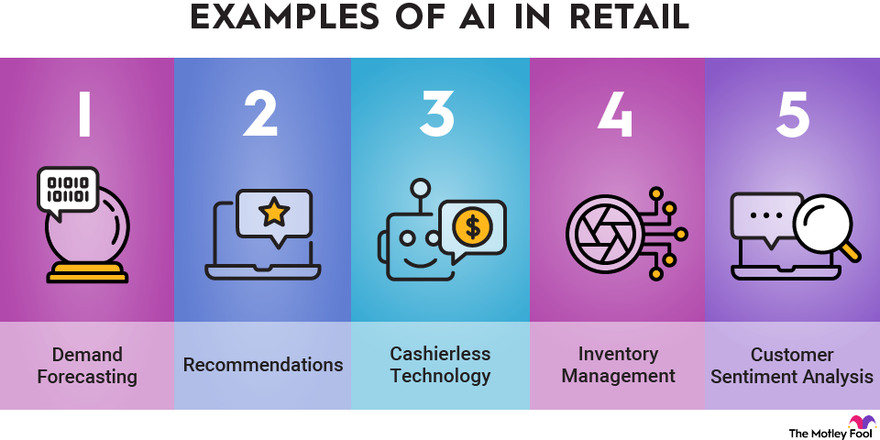AI is involved in a wide range of different use cases, with some of the most important ones being forecasting how many goods and products customers want to purchase in a specific time frame. That allows for improved and more efficient warehousing and using AI to automate warehouses to reduce operating expenses and increase reliability. There are many others on top of that:

Especially for online shopping and loyalty programs that use personalized apps, recommendations are important. Here, AI is used to analyze a customers’ needs, and the most appropriate items can be recommended, which increases customer satisfaction and retention.
In-store retailers are increasingly working on cashier-less technology to bring down store expenses, since it makes it easier to operate with prolonged opening hours. Computer vision can be used to scan the items in a customers’ bag or cart to calculate prices, with Amazon (NASDAQ:AMZN) rolling out this technology in its Amazon Go stores. There’s no cashier and you don’t have to scan any items yourself, you just walk out with the items you bought and AI handles the rest, making this very convenient for shoppers.
Chatbots that are used for customer service tasks are another AI-derived technology that’s deployed more and more widely – lower costs and happier customers make this technology highly attractive for retail companies.
Especially when it comes to buying clothing, accessories, and similar items, virtual reality (VR) and augmented reality (AR) are promising. These AI-based technologies allow customers to try on clothing, handbags, make-up, and so on, even when they shop from their own homes using their phones or tablets.
Home furnishing retailer IKEA is using AR tech to allow customers to “try out” how different items would look in their own homes.
Top Picks in Today’s AI Retail
Investors can benefit from the growth of AI in the retail industry in different ways. Investors could buy shares of retail companies that use AI right now, like Walmart (NYSE: WMT), using AI for inventory management and customer service chatbots, or Target (NYSE: TGT), using AI for personalized marketing and that forecasts demand using AI tools.
Yet direct plays on retail companies, especially brick-and-mortar retailers, oftentimes are lower-margin companies, even if they deploy AI, which is why they aren’t suitable for all investors.
Investors can also invest in the companies that power the use of AI technologies in the retail industry without being retailers themselves.
The data centers where chatbots, AR tech, computer vision algorithms, and so on are trained require massive computing power and highly advanced hardware and software.
This is where many high-growth companies come into play: NVIDIA (NASDAQ: NVDA) is the king in the AI data center space, of course, but Oracle (NASDAQ: ORCL), AMD (NASDAQ: AMD), Arm Holdings (NASDAQ: ARM), and similar companies will benefit as well.
Amazon is a bit of a hybrid – it’s a huge online retailer, but also a major AI innovator that develops its own algorithms, has vast data centers, its own cloud business, etc., which makes it attractive on a variety of levels.
Investors can also choose among some of our top Artificial Intelligence picks to benefit from increased Artificial Intelligence usage in the retail industry and across many other industries.

